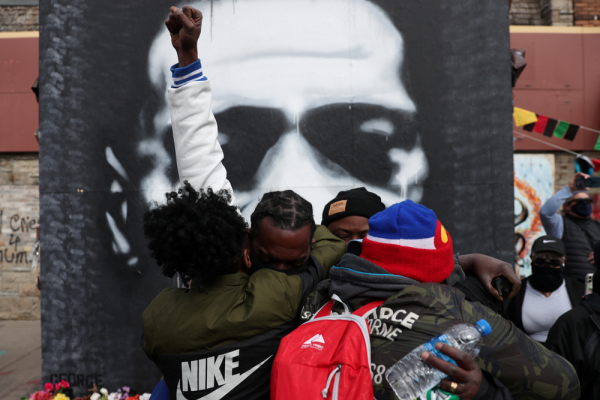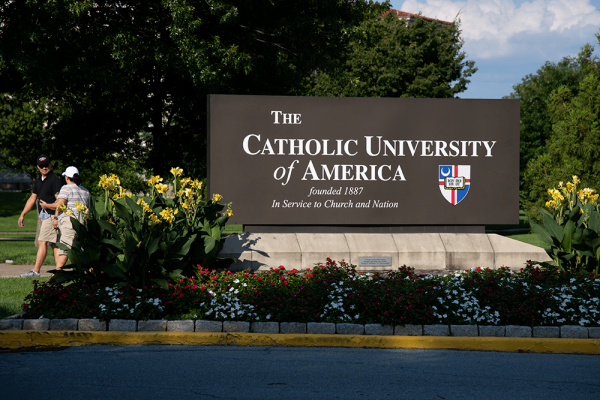Nearly one year after former Minneapolis police officer Derek Chauvin murdered George Floyd, a jury has found Chauvin guilty on all three of the charges he faced.
The 12 sequestered jurors considered three weeks of testimony from 45 witnesses, including bystanders, police officials, and medical experts, along with hours of video evidence. The judge revoked Chauvin’s bail and sent him back to jail while he awaits sentencing.
Floyd’s 2020 murder — along with the earlier police killing of Breonna Taylor in Kentucky and the murder of Ahmaud Arbery in Georgia — sparked a summer of protests against police violence toward Black people across the United States.
Brenda Blackhawk, a congregational organizer for racial justice with the Minneapolis Area Synod of the Evangelical Lutheran Church in America, said her initial reaction to the verdict was one of relief.
“That’s what the community really needed to see and hear, especially in the midst of another young Black man [Daunte Wright] being murdered,” Blackhawk told Sojourners. “This is just holding one person accountable — and that’s important, that’s a good piece of justice, but there is so much work left to be done to change the system as a whole.”
She said that while the verdict was a “ray of hope” amid a “frustrating and exhausting” season, some in her community wondered if people across the country would continue addressing police violence as a systemic issue.
“There’s a lot more work that still needs to be done, and now there’s a fear that some people who have been engaged [in racial justice work] because of this specific instance, will step back,” she said. “Keeping people engaged and keeping the momentum going toward change is important.”
National faith leaders agreed that justice must be considered in the broader context of Floyd’s death.
“Nothing will bring George Floyd back to his family or his community back to us,” Rev. Michael Curry, presiding bishop of the Episcopal Church, said in a statement released before the verdict was announced. “The struggle continues.”
The Presbyterian Church (USA) quoted from Rev. Diane Moffett, the president and executive director of the Presbyterian Mission Agency, in a statement posted to Twitter. “Holy One, There is still much work to be done. The struggle for justice stretches out before us today just as it did yesterday and in days gone by,” the statement said. “Give us strength to continue the struggle today, tomorrow and until your kin-dom comes.”
In a joint statement published on this website, Sojourners founder Jim Wallis and Sojourners president Rev. Adam Russell Taylor said, “This verdict does open the door to long overdue transformation of policing and criminal justice in America — and we should settle for nothing less. It is critical that our nation remembers what forces led to this verdict of accountability; and that it should not take so much in the future to convict police for abuse and lethal violence against black people and other people of color.”
“Justice and democracy were on trial today. While this is victory, it is not justice. It doesn’t bring George Floyd back,” Rev. Alvin Herring, executive director for Faith in Action, said in a statement. “Perhaps this is a moment where we can pivot as a nation and create policing systems that don’t lead with militarization but instead lead with love, that truly protect and serve.”
On Twitter, activists and faith leaders held the tension of being grateful for the verdict and recognizing the work still needed to end police brutality.
“George Floyd’s life mattered. It mattered to this jury. It mattered to God,” Joshua DuBois, a faith advisor during President Barack Obama’s tenure said on Twitter. “So much more work to do, but so grateful for this moment of justice.”
“This country has done the bare minimum too damn late,” Rev. Wil Gafney, a professor of Hebrew Bible at Brite Divinity School in Fort Worth, Texas, said in a series of tweets. “Days and weeks after we saw that murder televised nothing changed in policing in this country. Ask Daunte Wright. Ask Adam Toledo.”
Chauvin, who is white, had pleaded not guilty to second-degree unintentional murder, third-degree "depraved mind" murder, and second-degree manslaughter.
The jurors found Chauvin guilty of second-degree unintentional murder. Under this charge, the prosecutors did not have to prove that Chauvin had an intent to kill Floyd, only that Chauvin caused his death while committing or attempting to commit a felony.
The jurors also found Chauvin guilty of third-degree murder, which means they found that Floyd’s death was caused by “an act eminently dangerous to others and evincing a depraved mind, without regard to human life, but without intent to cause the death of any person.”
The third charge, second-degree manslaughter, means the jury found that Floyd’s death was caused by “culpable negligence,” involving “an unreasonable risk” in which Chauvin consciously took a chance of causing death or great bodily harm.
“Exhaling. My body still feels it. Holding George Floyd’s family and all the families whose beautiful loved ones were snatched from them without accountability or justice,” Christian writer Danté Stewart said in a tweet. “Holding them in love. We should not have to go through this. Do not get used to it. It is not normal.”
Jurors needed to reach a unanimous verdict on each charge. A single hold-out would have resulted in a mistrial, although the state could have tried Chauvin again. The jurors were four white women, two white men, three Black men, one Black woman, and two multiracial women, according to court records. The court has promised to shield their identities until some time after the verdict.
While reactions continue to be shared across the nation, Rev. Yolanda Pierce, dean of the Howard University School of Divinity, reminded that words were not the only way to react.
“Our tears are all the emotions for which we do not have words,” Pierce said on Twitter.
This story was updated to include additional statements from faith leaders. Reuters reporting contributed to this story.
Got something to say about what you're reading? We value your feedback!








